Organisational Behaviour: Power, Culture & Politics Influence on Teams
VerifiedAdded on 2023/06/18
|24
|6407
|197
Report
AI Summary
This report provides a comprehensive analysis of organisational behaviour, examining how power, culture, and politics influence individual and team behaviour within an organisation. It delves into various theories of motivation and their implementation to achieve organisational objectives, using British Airways as a case study. The report also explores the factors contributing to effective team formation and the application of organisational behaviour concepts and philosophies in specific business situations. Furthermore, it critically evaluates the impact of different motivational theories on employee behaviour and discusses team and group development theories to foster cooperation among team members, ultimately aiming to provide a thorough understanding of organisational dynamics and their practical implications.
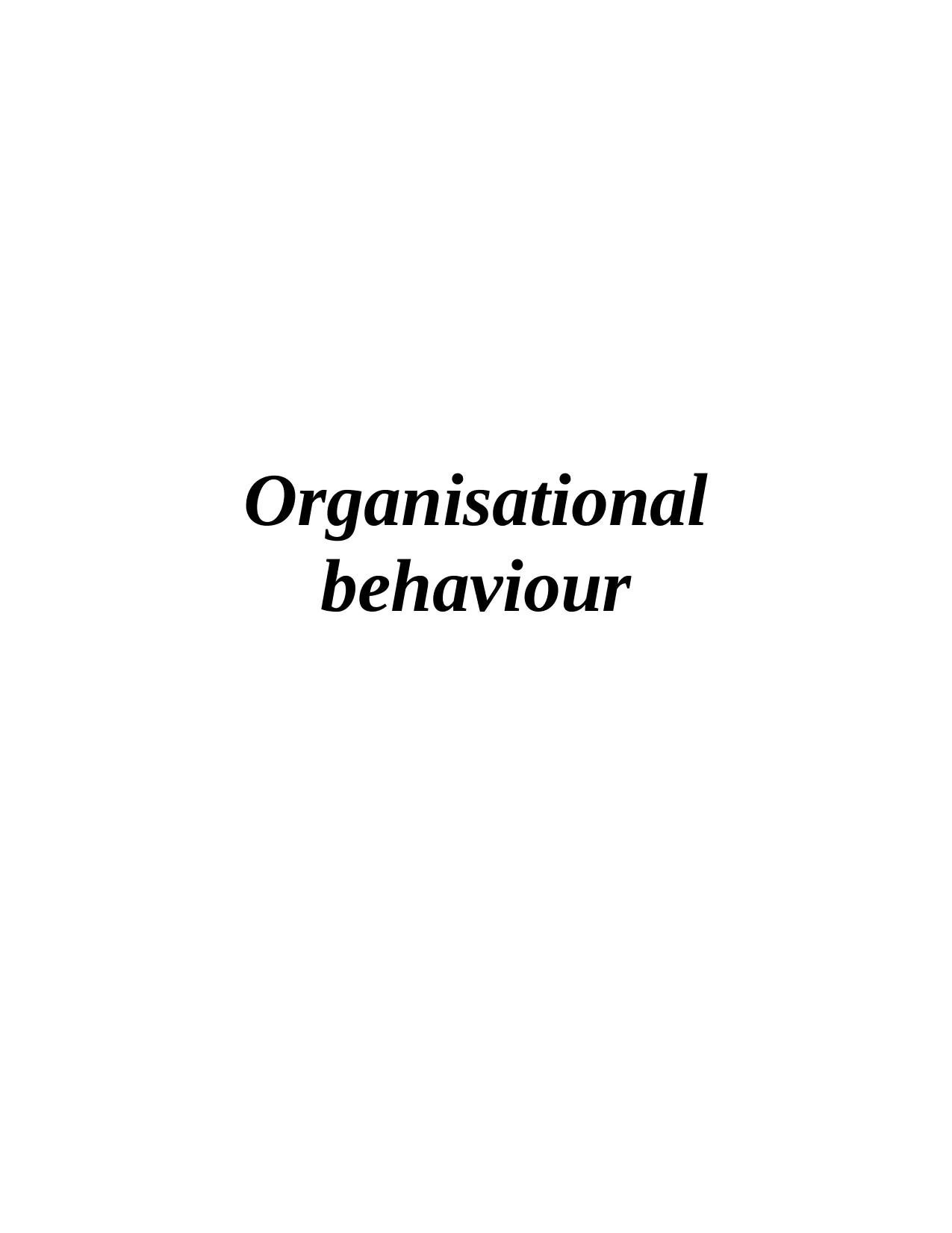
Organisational
behaviour
behaviour
Paraphrase This Document
Need a fresh take? Get an instant paraphrase of this document with our AI Paraphraser
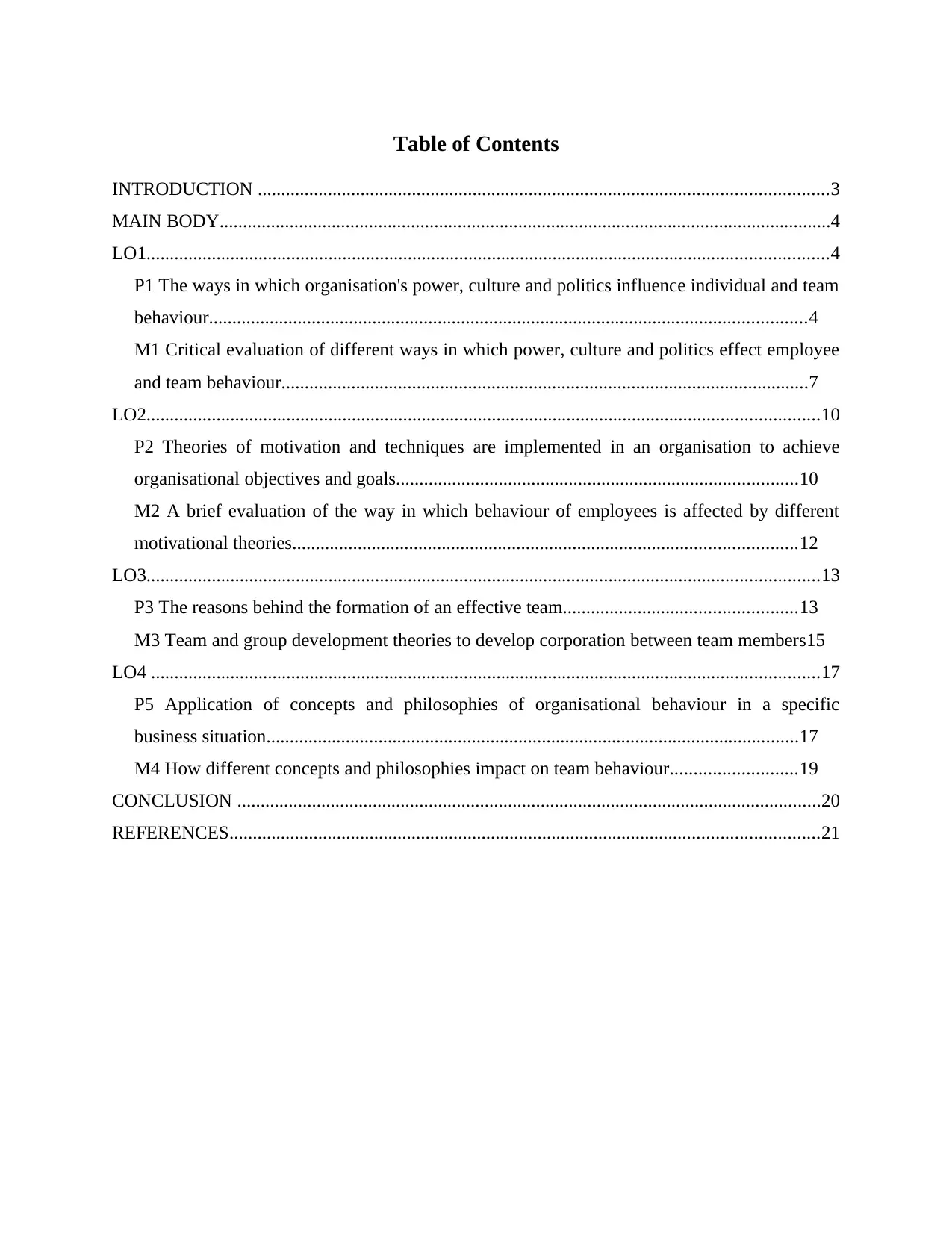
Table of Contents
INTRODUCTION ..........................................................................................................................3
MAIN BODY...................................................................................................................................4
LO1..................................................................................................................................................4
P1 The ways in which organisation's power, culture and politics influence individual and team
behaviour................................................................................................................................4
M1 Critical evaluation of different ways in which power, culture and politics effect employee
and team behaviour.................................................................................................................7
LO2................................................................................................................................................10
P2 Theories of motivation and techniques are implemented in an organisation to achieve
organisational objectives and goals......................................................................................10
M2 A brief evaluation of the way in which behaviour of employees is affected by different
motivational theories............................................................................................................12
LO3................................................................................................................................................13
P3 The reasons behind the formation of an effective team..................................................13
M3 Team and group development theories to develop corporation between team members15
LO4 ...............................................................................................................................................17
P5 Application of concepts and philosophies of organisational behaviour in a specific
business situation..................................................................................................................17
M4 How different concepts and philosophies impact on team behaviour...........................19
CONCLUSION .............................................................................................................................20
REFERENCES..............................................................................................................................21
INTRODUCTION ..........................................................................................................................3
MAIN BODY...................................................................................................................................4
LO1..................................................................................................................................................4
P1 The ways in which organisation's power, culture and politics influence individual and team
behaviour................................................................................................................................4
M1 Critical evaluation of different ways in which power, culture and politics effect employee
and team behaviour.................................................................................................................7
LO2................................................................................................................................................10
P2 Theories of motivation and techniques are implemented in an organisation to achieve
organisational objectives and goals......................................................................................10
M2 A brief evaluation of the way in which behaviour of employees is affected by different
motivational theories............................................................................................................12
LO3................................................................................................................................................13
P3 The reasons behind the formation of an effective team..................................................13
M3 Team and group development theories to develop corporation between team members15
LO4 ...............................................................................................................................................17
P5 Application of concepts and philosophies of organisational behaviour in a specific
business situation..................................................................................................................17
M4 How different concepts and philosophies impact on team behaviour...........................19
CONCLUSION .............................................................................................................................20
REFERENCES..............................................................................................................................21
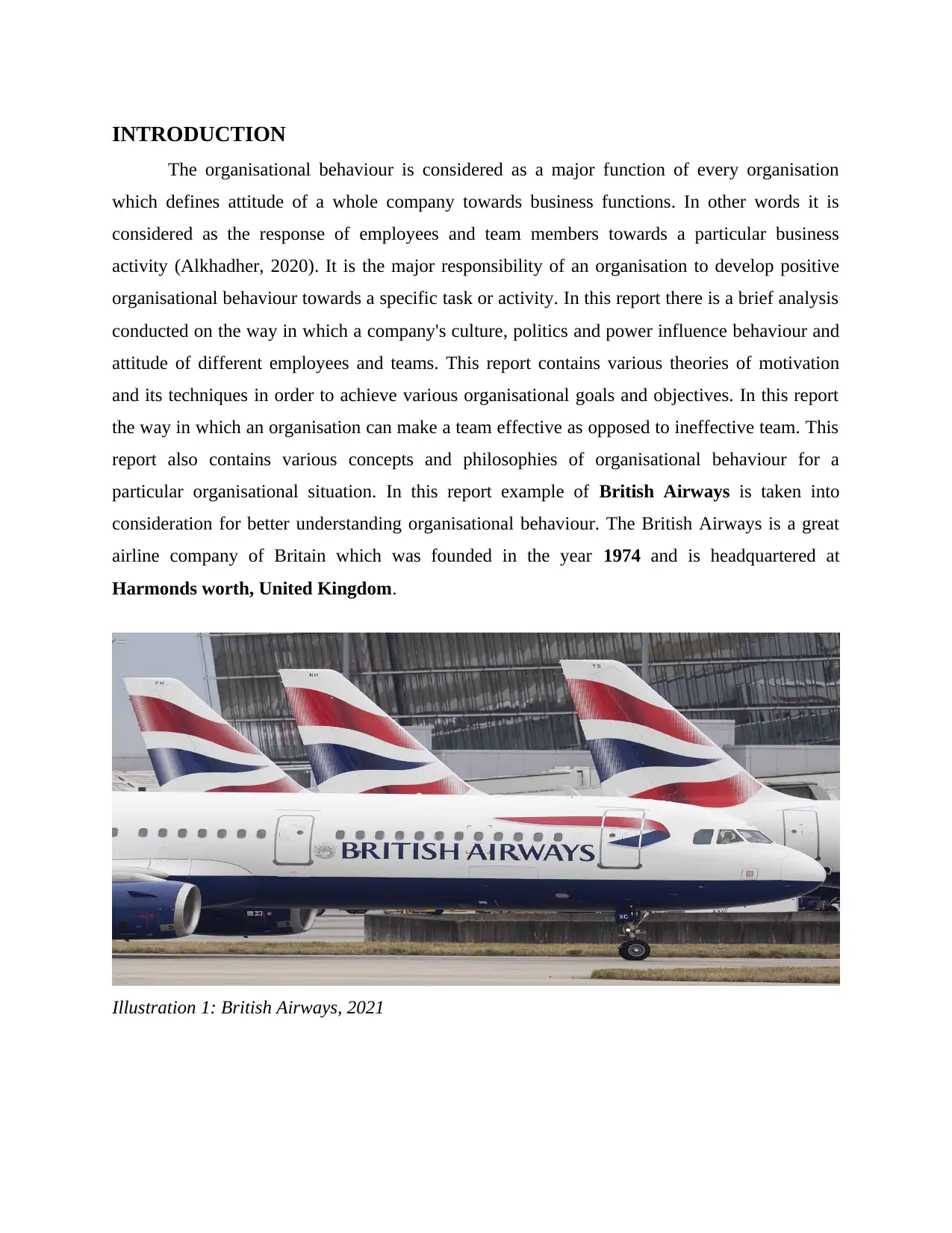
INTRODUCTION
The organisational behaviour is considered as a major function of every organisation
which defines attitude of a whole company towards business functions. In other words it is
considered as the response of employees and team members towards a particular business
activity (Alkhadher, 2020). It is the major responsibility of an organisation to develop positive
organisational behaviour towards a specific task or activity. In this report there is a brief analysis
conducted on the way in which a company's culture, politics and power influence behaviour and
attitude of different employees and teams. This report contains various theories of motivation
and its techniques in order to achieve various organisational goals and objectives. In this report
the way in which an organisation can make a team effective as opposed to ineffective team. This
report also contains various concepts and philosophies of organisational behaviour for a
particular organisational situation. In this report example of British Airways is taken into
consideration for better understanding organisational behaviour. The British Airways is a great
airline company of Britain which was founded in the year 1974 and is headquartered at
Harmonds worth, United Kingdom.
Illustration 1: British Airways, 2021
The organisational behaviour is considered as a major function of every organisation
which defines attitude of a whole company towards business functions. In other words it is
considered as the response of employees and team members towards a particular business
activity (Alkhadher, 2020). It is the major responsibility of an organisation to develop positive
organisational behaviour towards a specific task or activity. In this report there is a brief analysis
conducted on the way in which a company's culture, politics and power influence behaviour and
attitude of different employees and teams. This report contains various theories of motivation
and its techniques in order to achieve various organisational goals and objectives. In this report
the way in which an organisation can make a team effective as opposed to ineffective team. This
report also contains various concepts and philosophies of organisational behaviour for a
particular organisational situation. In this report example of British Airways is taken into
consideration for better understanding organisational behaviour. The British Airways is a great
airline company of Britain which was founded in the year 1974 and is headquartered at
Harmonds worth, United Kingdom.
Illustration 1: British Airways, 2021
⊘ This is a preview!⊘
Do you want full access?
Subscribe today to unlock all pages.

Trusted by 1+ million students worldwide
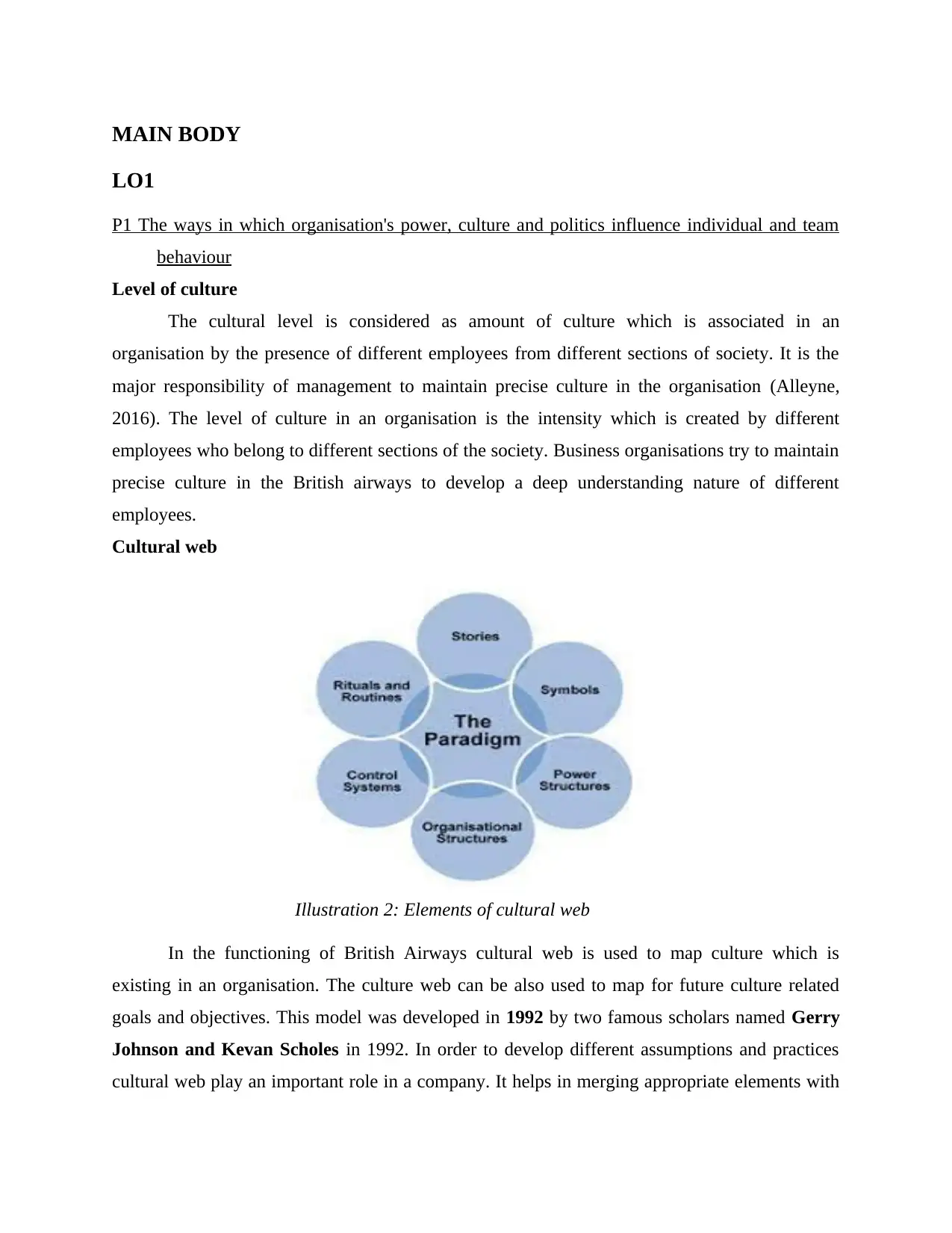
MAIN BODY
LO1
P1 The ways in which organisation's power, culture and politics influence individual and team
behaviour
Level of culture
The cultural level is considered as amount of culture which is associated in an
organisation by the presence of different employees from different sections of society. It is the
major responsibility of management to maintain precise culture in the organisation (Alleyne,
2016). The level of culture in an organisation is the intensity which is created by different
employees who belong to different sections of the society. Business organisations try to maintain
precise culture in the British airways to develop a deep understanding nature of different
employees.
Cultural web
In the functioning of British Airways cultural web is used to map culture which is
existing in an organisation. The culture web can be also used to map for future culture related
goals and objectives. This model was developed in 1992 by two famous scholars named Gerry
Johnson and Kevan Scholes in 1992. In order to develop different assumptions and practices
cultural web play an important role in a company. It helps in merging appropriate elements with
Illustration 2: Elements of cultural web
LO1
P1 The ways in which organisation's power, culture and politics influence individual and team
behaviour
Level of culture
The cultural level is considered as amount of culture which is associated in an
organisation by the presence of different employees from different sections of society. It is the
major responsibility of management to maintain precise culture in the organisation (Alleyne,
2016). The level of culture in an organisation is the intensity which is created by different
employees who belong to different sections of the society. Business organisations try to maintain
precise culture in the British airways to develop a deep understanding nature of different
employees.
Cultural web
In the functioning of British Airways cultural web is used to map culture which is
existing in an organisation. The culture web can be also used to map for future culture related
goals and objectives. This model was developed in 1992 by two famous scholars named Gerry
Johnson and Kevan Scholes in 1992. In order to develop different assumptions and practices
cultural web play an important role in a company. It helps in merging appropriate elements with
Illustration 2: Elements of cultural web
Paraphrase This Document
Need a fresh take? Get an instant paraphrase of this document with our AI Paraphraser
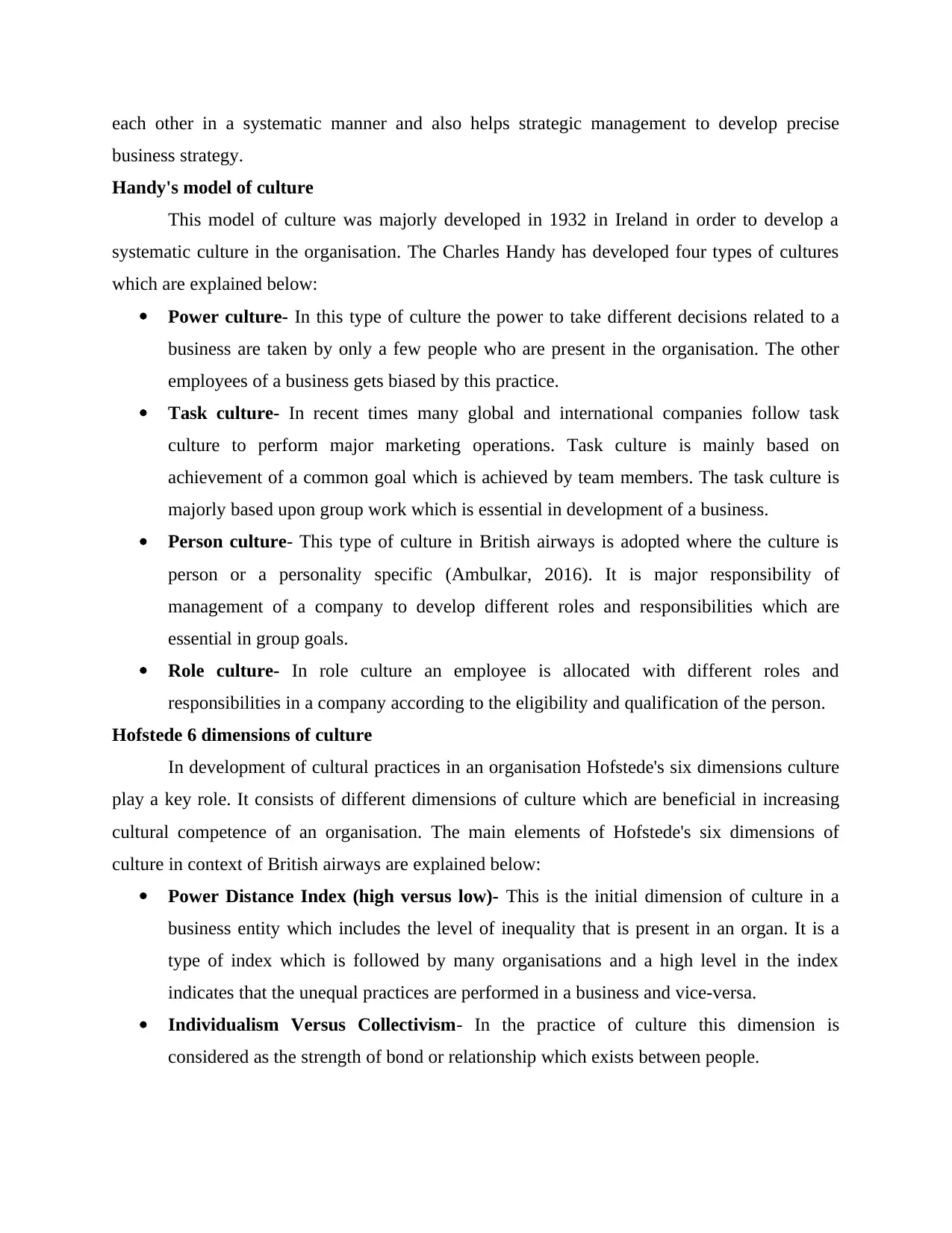
each other in a systematic manner and also helps strategic management to develop precise
business strategy.
Handy's model of culture
This model of culture was majorly developed in 1932 in Ireland in order to develop a
systematic culture in the organisation. The Charles Handy has developed four types of cultures
which are explained below:
Power culture- In this type of culture the power to take different decisions related to a
business are taken by only a few people who are present in the organisation. The other
employees of a business gets biased by this practice.
Task culture- In recent times many global and international companies follow task
culture to perform major marketing operations. Task culture is mainly based on
achievement of a common goal which is achieved by team members. The task culture is
majorly based upon group work which is essential in development of a business.
Person culture- This type of culture in British airways is adopted where the culture is
person or a personality specific (Ambulkar, 2016). It is major responsibility of
management of a company to develop different roles and responsibilities which are
essential in group goals.
Role culture- In role culture an employee is allocated with different roles and
responsibilities in a company according to the eligibility and qualification of the person.
Hofstede 6 dimensions of culture
In development of cultural practices in an organisation Hofstede's six dimensions culture
play a key role. It consists of different dimensions of culture which are beneficial in increasing
cultural competence of an organisation. The main elements of Hofstede's six dimensions of
culture in context of British airways are explained below:
Power Distance Index (high versus low)- This is the initial dimension of culture in a
business entity which includes the level of inequality that is present in an organ. It is a
type of index which is followed by many organisations and a high level in the index
indicates that the unequal practices are performed in a business and vice-versa.
Individualism Versus Collectivism- In the practice of culture this dimension is
considered as the strength of bond or relationship which exists between people.
business strategy.
Handy's model of culture
This model of culture was majorly developed in 1932 in Ireland in order to develop a
systematic culture in the organisation. The Charles Handy has developed four types of cultures
which are explained below:
Power culture- In this type of culture the power to take different decisions related to a
business are taken by only a few people who are present in the organisation. The other
employees of a business gets biased by this practice.
Task culture- In recent times many global and international companies follow task
culture to perform major marketing operations. Task culture is mainly based on
achievement of a common goal which is achieved by team members. The task culture is
majorly based upon group work which is essential in development of a business.
Person culture- This type of culture in British airways is adopted where the culture is
person or a personality specific (Ambulkar, 2016). It is major responsibility of
management of a company to develop different roles and responsibilities which are
essential in group goals.
Role culture- In role culture an employee is allocated with different roles and
responsibilities in a company according to the eligibility and qualification of the person.
Hofstede 6 dimensions of culture
In development of cultural practices in an organisation Hofstede's six dimensions culture
play a key role. It consists of different dimensions of culture which are beneficial in increasing
cultural competence of an organisation. The main elements of Hofstede's six dimensions of
culture in context of British airways are explained below:
Power Distance Index (high versus low)- This is the initial dimension of culture in a
business entity which includes the level of inequality that is present in an organ. It is a
type of index which is followed by many organisations and a high level in the index
indicates that the unequal practices are performed in a business and vice-versa.
Individualism Versus Collectivism- In the practice of culture this dimension is
considered as the strength of bond or relationship which exists between people.
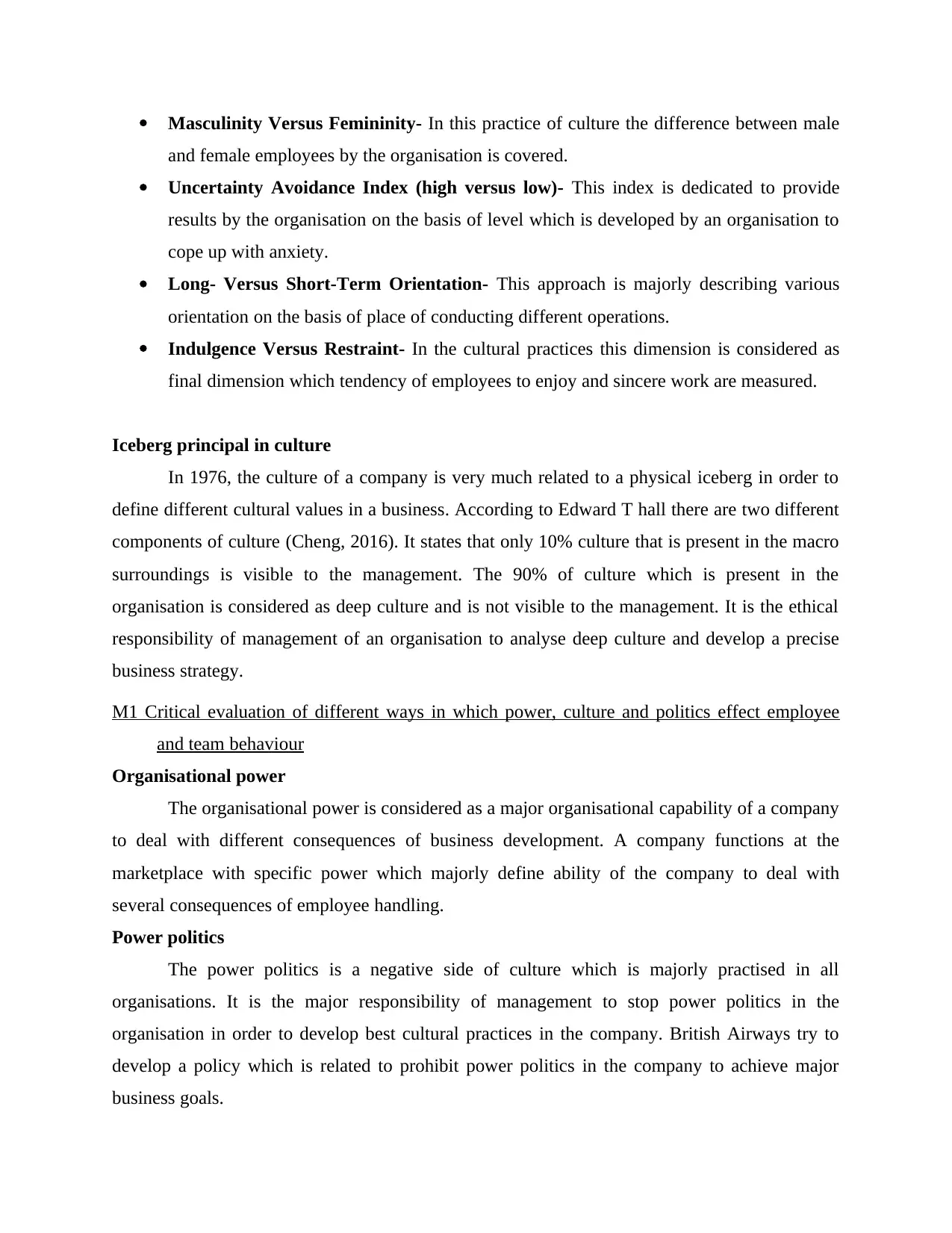
Masculinity Versus Femininity- In this practice of culture the difference between male
and female employees by the organisation is covered.
Uncertainty Avoidance Index (high versus low)- This index is dedicated to provide
results by the organisation on the basis of level which is developed by an organisation to
cope up with anxiety.
Long- Versus Short-Term Orientation- This approach is majorly describing various
orientation on the basis of place of conducting different operations.
Indulgence Versus Restraint- In the cultural practices this dimension is considered as
final dimension which tendency of employees to enjoy and sincere work are measured.
Iceberg principal in culture
In 1976, the culture of a company is very much related to a physical iceberg in order to
define different cultural values in a business. According to Edward T hall there are two different
components of culture (Cheng, 2016). It states that only 10% culture that is present in the macro
surroundings is visible to the management. The 90% of culture which is present in the
organisation is considered as deep culture and is not visible to the management. It is the ethical
responsibility of management of an organisation to analyse deep culture and develop a precise
business strategy.
M1 Critical evaluation of different ways in which power, culture and politics effect employee
and team behaviour
Organisational power
The organisational power is considered as a major organisational capability of a company
to deal with different consequences of business development. A company functions at the
marketplace with specific power which majorly define ability of the company to deal with
several consequences of employee handling.
Power politics
The power politics is a negative side of culture which is majorly practised in all
organisations. It is the major responsibility of management to stop power politics in the
organisation in order to develop best cultural practices in the company. British Airways try to
develop a policy which is related to prohibit power politics in the company to achieve major
business goals.
and female employees by the organisation is covered.
Uncertainty Avoidance Index (high versus low)- This index is dedicated to provide
results by the organisation on the basis of level which is developed by an organisation to
cope up with anxiety.
Long- Versus Short-Term Orientation- This approach is majorly describing various
orientation on the basis of place of conducting different operations.
Indulgence Versus Restraint- In the cultural practices this dimension is considered as
final dimension which tendency of employees to enjoy and sincere work are measured.
Iceberg principal in culture
In 1976, the culture of a company is very much related to a physical iceberg in order to
define different cultural values in a business. According to Edward T hall there are two different
components of culture (Cheng, 2016). It states that only 10% culture that is present in the macro
surroundings is visible to the management. The 90% of culture which is present in the
organisation is considered as deep culture and is not visible to the management. It is the ethical
responsibility of management of an organisation to analyse deep culture and develop a precise
business strategy.
M1 Critical evaluation of different ways in which power, culture and politics effect employee
and team behaviour
Organisational power
The organisational power is considered as a major organisational capability of a company
to deal with different consequences of business development. A company functions at the
marketplace with specific power which majorly define ability of the company to deal with
several consequences of employee handling.
Power politics
The power politics is a negative side of culture which is majorly practised in all
organisations. It is the major responsibility of management to stop power politics in the
organisation in order to develop best cultural practices in the company. British Airways try to
develop a policy which is related to prohibit power politics in the company to achieve major
business goals.
⊘ This is a preview!⊘
Do you want full access?
Subscribe today to unlock all pages.

Trusted by 1+ million students worldwide
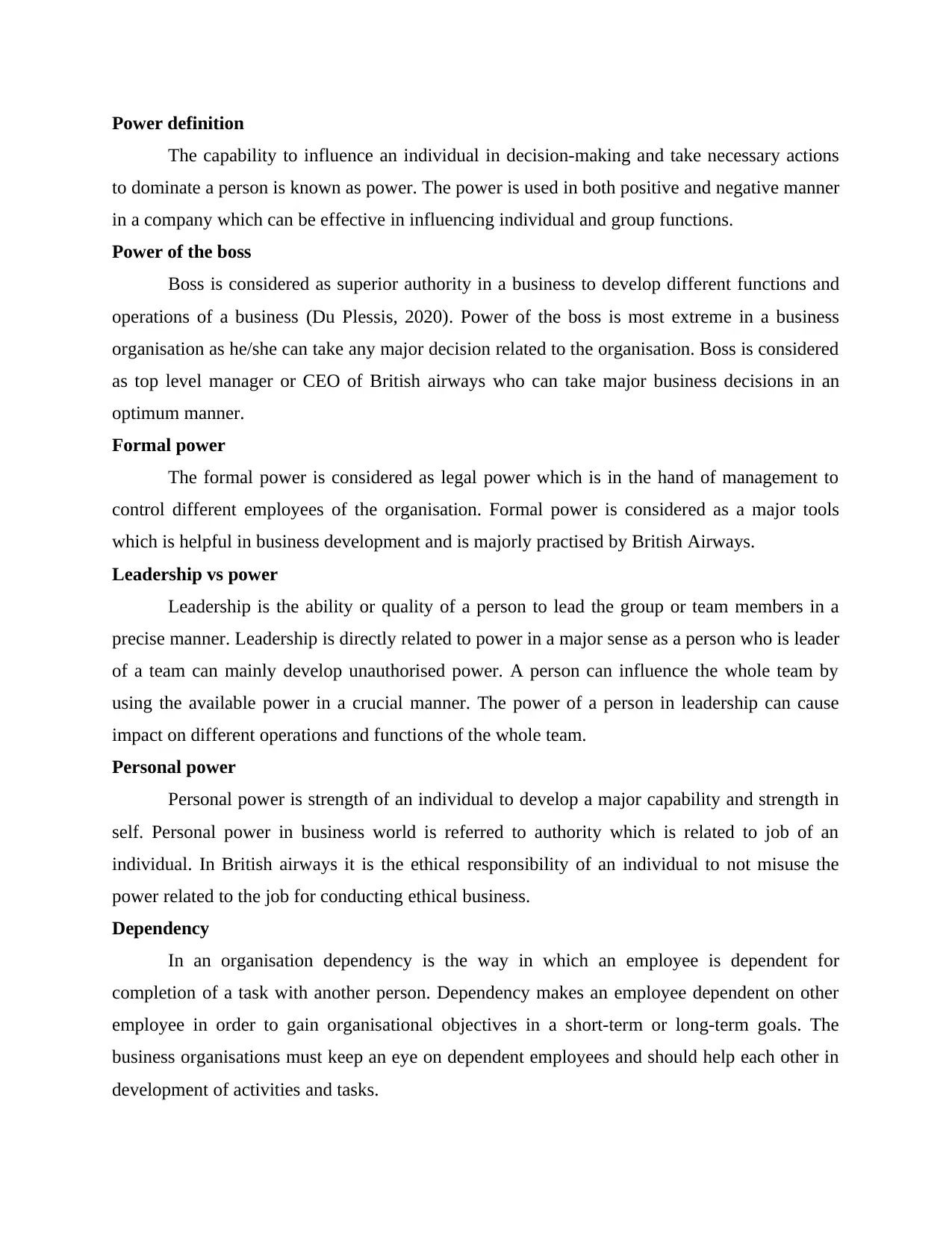
Power definition
The capability to influence an individual in decision-making and take necessary actions
to dominate a person is known as power. The power is used in both positive and negative manner
in a company which can be effective in influencing individual and group functions.
Power of the boss
Boss is considered as superior authority in a business to develop different functions and
operations of a business (Du Plessis, 2020). Power of the boss is most extreme in a business
organisation as he/she can take any major decision related to the organisation. Boss is considered
as top level manager or CEO of British airways who can take major business decisions in an
optimum manner.
Formal power
The formal power is considered as legal power which is in the hand of management to
control different employees of the organisation. Formal power is considered as a major tools
which is helpful in business development and is majorly practised by British Airways.
Leadership vs power
Leadership is the ability or quality of a person to lead the group or team members in a
precise manner. Leadership is directly related to power in a major sense as a person who is leader
of a team can mainly develop unauthorised power. A person can influence the whole team by
using the available power in a crucial manner. The power of a person in leadership can cause
impact on different operations and functions of the whole team.
Personal power
Personal power is strength of an individual to develop a major capability and strength in
self. Personal power in business world is referred to authority which is related to job of an
individual. In British airways it is the ethical responsibility of an individual to not misuse the
power related to the job for conducting ethical business.
Dependency
In an organisation dependency is the way in which an employee is dependent for
completion of a task with another person. Dependency makes an employee dependent on other
employee in order to gain organisational objectives in a short-term or long-term goals. The
business organisations must keep an eye on dependent employees and should help each other in
development of activities and tasks.
The capability to influence an individual in decision-making and take necessary actions
to dominate a person is known as power. The power is used in both positive and negative manner
in a company which can be effective in influencing individual and group functions.
Power of the boss
Boss is considered as superior authority in a business to develop different functions and
operations of a business (Du Plessis, 2020). Power of the boss is most extreme in a business
organisation as he/she can take any major decision related to the organisation. Boss is considered
as top level manager or CEO of British airways who can take major business decisions in an
optimum manner.
Formal power
The formal power is considered as legal power which is in the hand of management to
control different employees of the organisation. Formal power is considered as a major tools
which is helpful in business development and is majorly practised by British Airways.
Leadership vs power
Leadership is the ability or quality of a person to lead the group or team members in a
precise manner. Leadership is directly related to power in a major sense as a person who is leader
of a team can mainly develop unauthorised power. A person can influence the whole team by
using the available power in a crucial manner. The power of a person in leadership can cause
impact on different operations and functions of the whole team.
Personal power
Personal power is strength of an individual to develop a major capability and strength in
self. Personal power in business world is referred to authority which is related to job of an
individual. In British airways it is the ethical responsibility of an individual to not misuse the
power related to the job for conducting ethical business.
Dependency
In an organisation dependency is the way in which an employee is dependent for
completion of a task with another person. Dependency makes an employee dependent on other
employee in order to gain organisational objectives in a short-term or long-term goals. The
business organisations must keep an eye on dependent employees and should help each other in
development of activities and tasks.
Paraphrase This Document
Need a fresh take? Get an instant paraphrase of this document with our AI Paraphraser
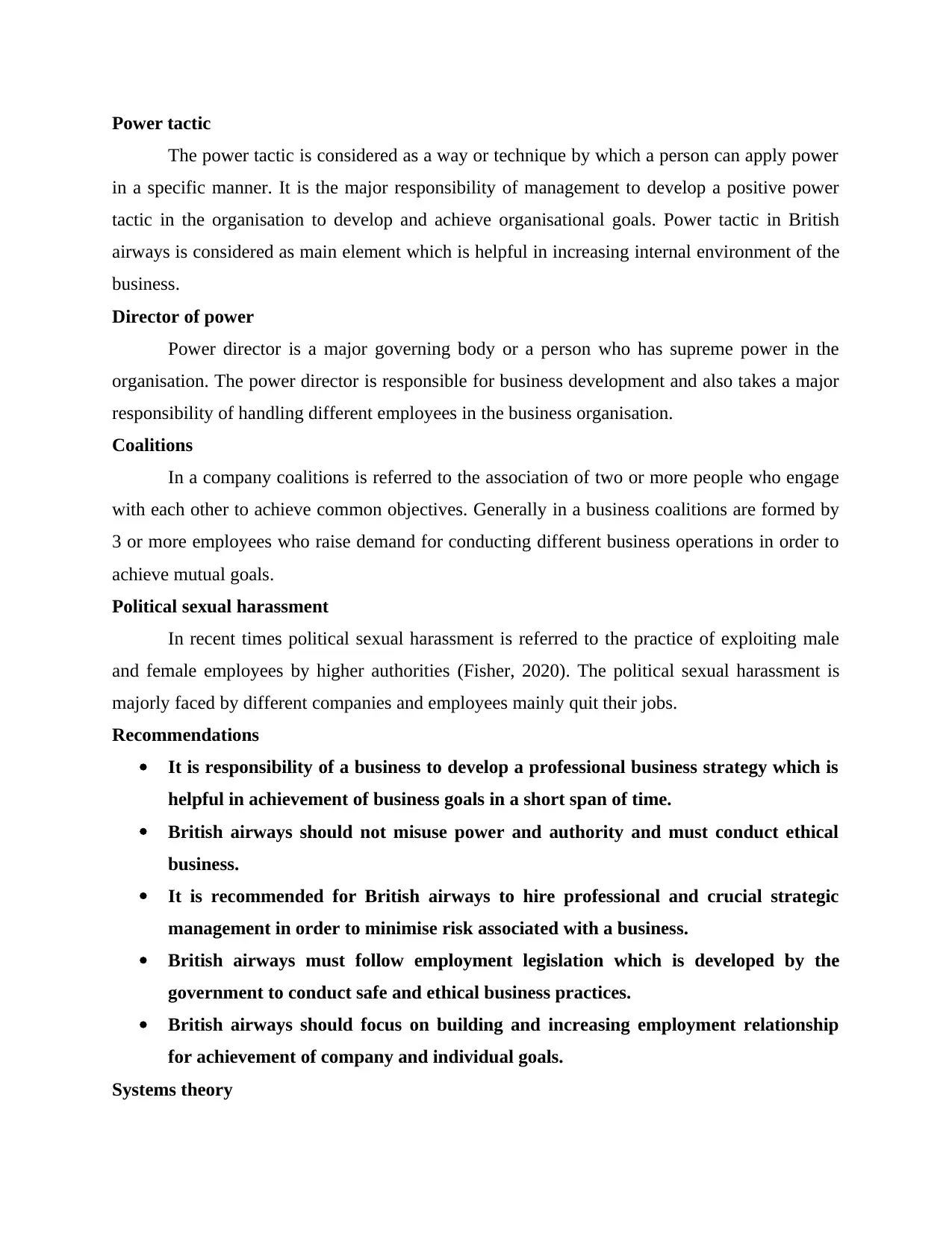
Power tactic
The power tactic is considered as a way or technique by which a person can apply power
in a specific manner. It is the major responsibility of management to develop a positive power
tactic in the organisation to develop and achieve organisational goals. Power tactic in British
airways is considered as main element which is helpful in increasing internal environment of the
business.
Director of power
Power director is a major governing body or a person who has supreme power in the
organisation. The power director is responsible for business development and also takes a major
responsibility of handling different employees in the business organisation.
Coalitions
In a company coalitions is referred to the association of two or more people who engage
with each other to achieve common objectives. Generally in a business coalitions are formed by
3 or more employees who raise demand for conducting different business operations in order to
achieve mutual goals.
Political sexual harassment
In recent times political sexual harassment is referred to the practice of exploiting male
and female employees by higher authorities (Fisher, 2020). The political sexual harassment is
majorly faced by different companies and employees mainly quit their jobs.
Recommendations
It is responsibility of a business to develop a professional business strategy which is
helpful in achievement of business goals in a short span of time.
British airways should not misuse power and authority and must conduct ethical
business.
It is recommended for British airways to hire professional and crucial strategic
management in order to minimise risk associated with a business.
British airways must follow employment legislation which is developed by the
government to conduct safe and ethical business practices.
British airways should focus on building and increasing employment relationship
for achievement of company and individual goals.
Systems theory
The power tactic is considered as a way or technique by which a person can apply power
in a specific manner. It is the major responsibility of management to develop a positive power
tactic in the organisation to develop and achieve organisational goals. Power tactic in British
airways is considered as main element which is helpful in increasing internal environment of the
business.
Director of power
Power director is a major governing body or a person who has supreme power in the
organisation. The power director is responsible for business development and also takes a major
responsibility of handling different employees in the business organisation.
Coalitions
In a company coalitions is referred to the association of two or more people who engage
with each other to achieve common objectives. Generally in a business coalitions are formed by
3 or more employees who raise demand for conducting different business operations in order to
achieve mutual goals.
Political sexual harassment
In recent times political sexual harassment is referred to the practice of exploiting male
and female employees by higher authorities (Fisher, 2020). The political sexual harassment is
majorly faced by different companies and employees mainly quit their jobs.
Recommendations
It is responsibility of a business to develop a professional business strategy which is
helpful in achievement of business goals in a short span of time.
British airways should not misuse power and authority and must conduct ethical
business.
It is recommended for British airways to hire professional and crucial strategic
management in order to minimise risk associated with a business.
British airways must follow employment legislation which is developed by the
government to conduct safe and ethical business practices.
British airways should focus on building and increasing employment relationship
for achievement of company and individual goals.
Systems theory
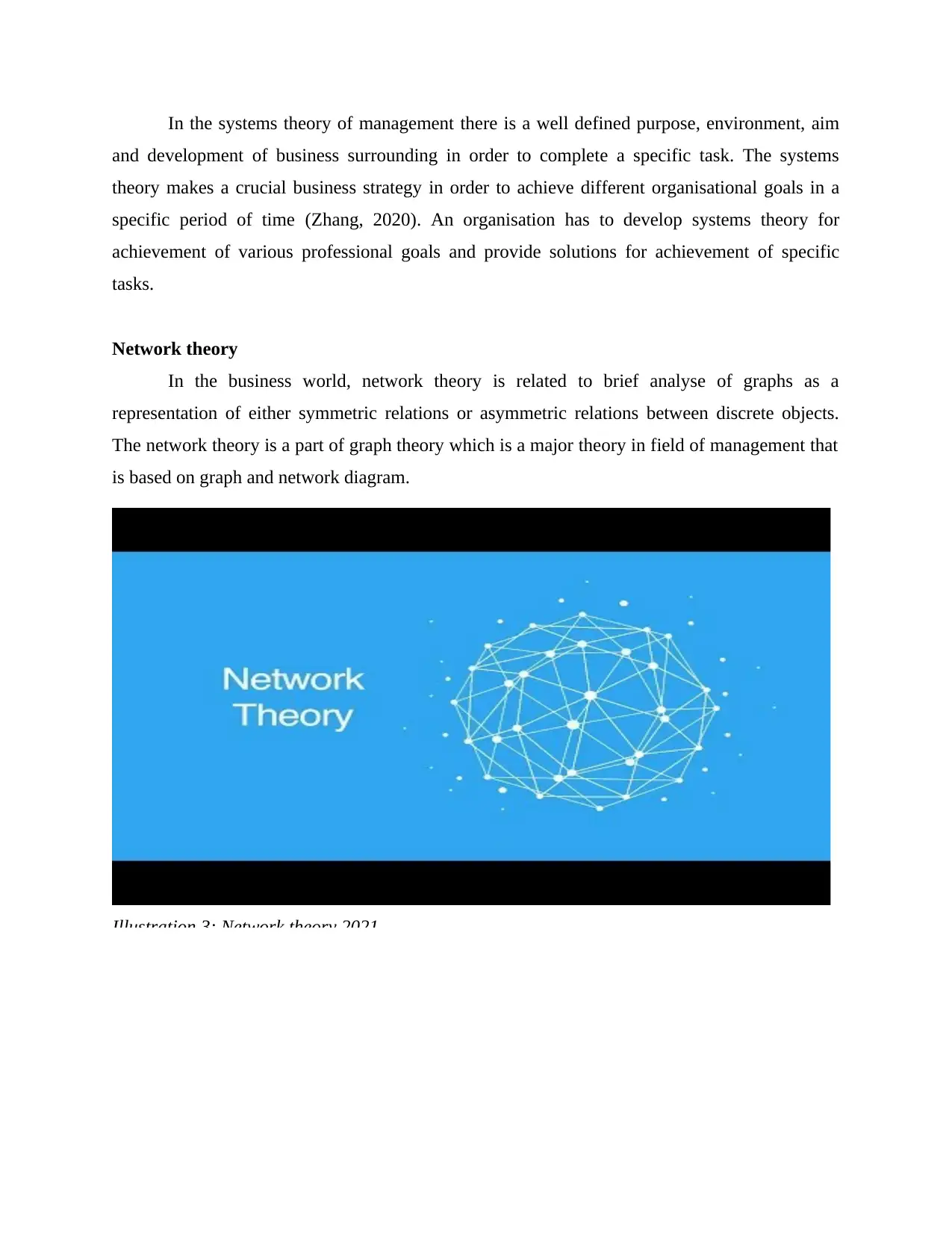
In the systems theory of management there is a well defined purpose, environment, aim
and development of business surrounding in order to complete a specific task. The systems
theory makes a crucial business strategy in order to achieve different organisational goals in a
specific period of time (Zhang, 2020). An organisation has to develop systems theory for
achievement of various professional goals and provide solutions for achievement of specific
tasks.
Network theory
In the business world, network theory is related to brief analyse of graphs as a
representation of either symmetric relations or asymmetric relations between discrete objects.
The network theory is a part of graph theory which is a major theory in field of management that
is based on graph and network diagram.
Illustration 3: Network theory,2021
and development of business surrounding in order to complete a specific task. The systems
theory makes a crucial business strategy in order to achieve different organisational goals in a
specific period of time (Zhang, 2020). An organisation has to develop systems theory for
achievement of various professional goals and provide solutions for achievement of specific
tasks.
Network theory
In the business world, network theory is related to brief analyse of graphs as a
representation of either symmetric relations or asymmetric relations between discrete objects.
The network theory is a part of graph theory which is a major theory in field of management that
is based on graph and network diagram.
Illustration 3: Network theory,2021
⊘ This is a preview!⊘
Do you want full access?
Subscribe today to unlock all pages.

Trusted by 1+ million students worldwide
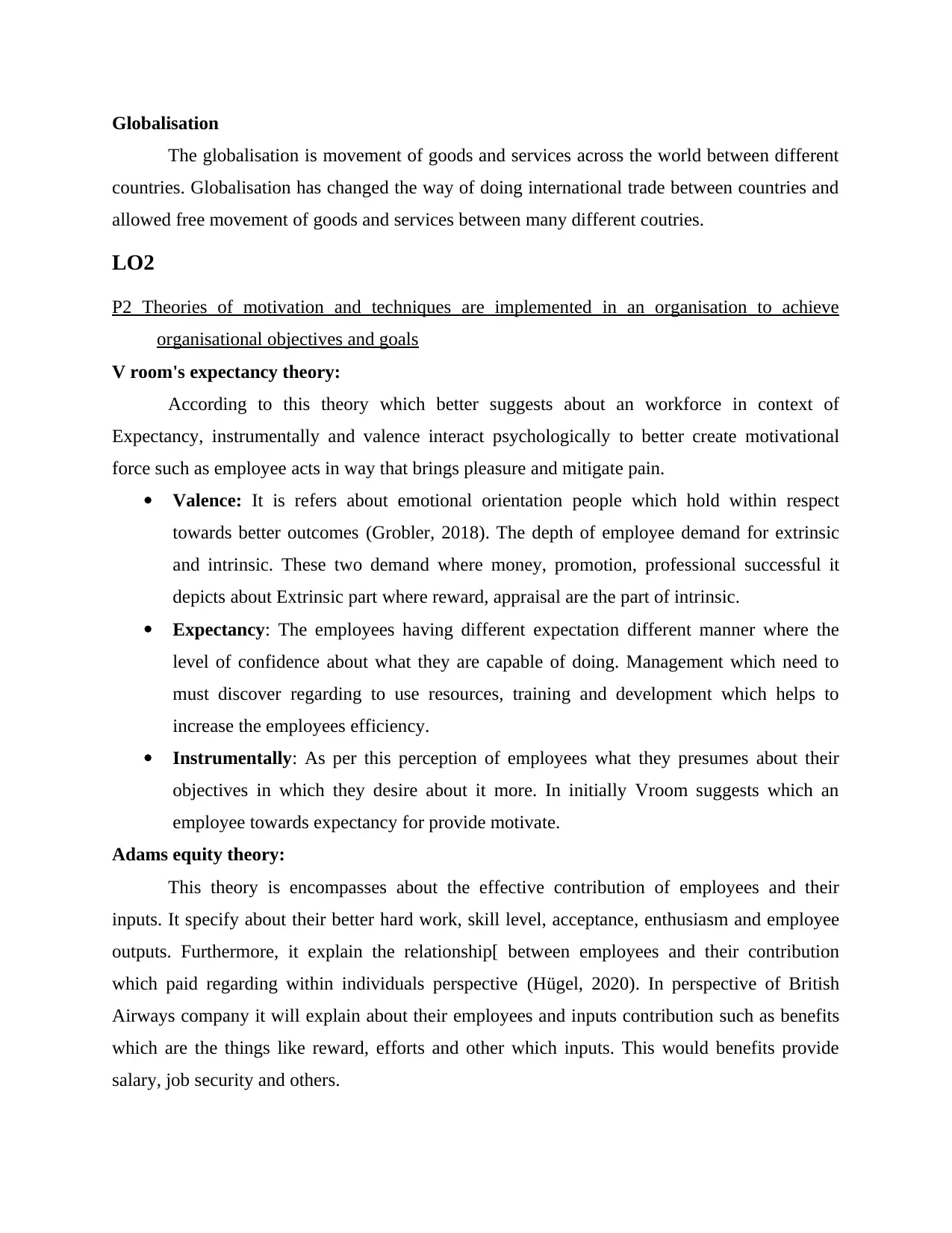
Globalisation
The globalisation is movement of goods and services across the world between different
countries. Globalisation has changed the way of doing international trade between countries and
allowed free movement of goods and services between many different coutries.
LO2
P2 Theories of motivation and techniques are implemented in an organisation to achieve
organisational objectives and goals
V room's expectancy theory:
According to this theory which better suggests about an workforce in context of
Expectancy, instrumentally and valence interact psychologically to better create motivational
force such as employee acts in way that brings pleasure and mitigate pain.
Valence: It is refers about emotional orientation people which hold within respect
towards better outcomes (Grobler, 2018). The depth of employee demand for extrinsic
and intrinsic. These two demand where money, promotion, professional successful it
depicts about Extrinsic part where reward, appraisal are the part of intrinsic.
Expectancy: The employees having different expectation different manner where the
level of confidence about what they are capable of doing. Management which need to
must discover regarding to use resources, training and development which helps to
increase the employees efficiency.
Instrumentally: As per this perception of employees what they presumes about their
objectives in which they desire about it more. In initially Vroom suggests which an
employee towards expectancy for provide motivate.
Adams equity theory:
This theory is encompasses about the effective contribution of employees and their
inputs. It specify about their better hard work, skill level, acceptance, enthusiasm and employee
outputs. Furthermore, it explain the relationship[ between employees and their contribution
which paid regarding within individuals perspective (Hügel, 2020). In perspective of British
Airways company it will explain about their employees and inputs contribution such as benefits
which are the things like reward, efforts and other which inputs. This would benefits provide
salary, job security and others.
The globalisation is movement of goods and services across the world between different
countries. Globalisation has changed the way of doing international trade between countries and
allowed free movement of goods and services between many different coutries.
LO2
P2 Theories of motivation and techniques are implemented in an organisation to achieve
organisational objectives and goals
V room's expectancy theory:
According to this theory which better suggests about an workforce in context of
Expectancy, instrumentally and valence interact psychologically to better create motivational
force such as employee acts in way that brings pleasure and mitigate pain.
Valence: It is refers about emotional orientation people which hold within respect
towards better outcomes (Grobler, 2018). The depth of employee demand for extrinsic
and intrinsic. These two demand where money, promotion, professional successful it
depicts about Extrinsic part where reward, appraisal are the part of intrinsic.
Expectancy: The employees having different expectation different manner where the
level of confidence about what they are capable of doing. Management which need to
must discover regarding to use resources, training and development which helps to
increase the employees efficiency.
Instrumentally: As per this perception of employees what they presumes about their
objectives in which they desire about it more. In initially Vroom suggests which an
employee towards expectancy for provide motivate.
Adams equity theory:
This theory is encompasses about the effective contribution of employees and their
inputs. It specify about their better hard work, skill level, acceptance, enthusiasm and employee
outputs. Furthermore, it explain the relationship[ between employees and their contribution
which paid regarding within individuals perspective (Hügel, 2020). In perspective of British
Airways company it will explain about their employees and inputs contribution such as benefits
which are the things like reward, efforts and other which inputs. This would benefits provide
salary, job security and others.
Paraphrase This Document
Need a fresh take? Get an instant paraphrase of this document with our AI Paraphraser
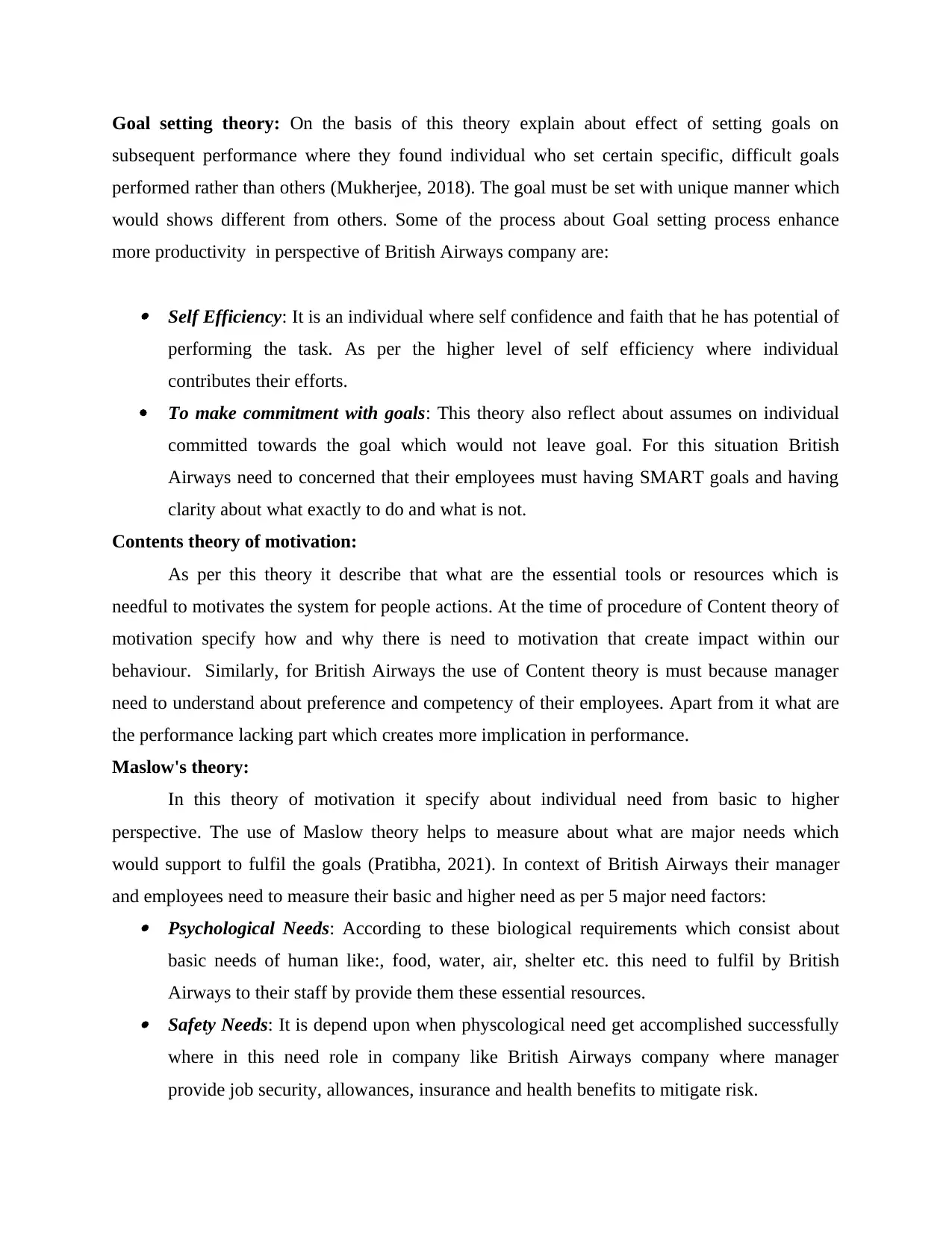
Goal setting theory: On the basis of this theory explain about effect of setting goals on
subsequent performance where they found individual who set certain specific, difficult goals
performed rather than others (Mukherjee, 2018). The goal must be set with unique manner which
would shows different from others. Some of the process about Goal setting process enhance
more productivity in perspective of British Airways company are:
Self Efficiency: It is an individual where self confidence and faith that he has potential of
performing the task. As per the higher level of self efficiency where individual
contributes their efforts.
To make commitment with goals: This theory also reflect about assumes on individual
committed towards the goal which would not leave goal. For this situation British
Airways need to concerned that their employees must having SMART goals and having
clarity about what exactly to do and what is not.
Contents theory of motivation:
As per this theory it describe that what are the essential tools or resources which is
needful to motivates the system for people actions. At the time of procedure of Content theory of
motivation specify how and why there is need to motivation that create impact within our
behaviour. Similarly, for British Airways the use of Content theory is must because manager
need to understand about preference and competency of their employees. Apart from it what are
the performance lacking part which creates more implication in performance.
Maslow's theory:
In this theory of motivation it specify about individual need from basic to higher
perspective. The use of Maslow theory helps to measure about what are major needs which
would support to fulfil the goals (Pratibha, 2021). In context of British Airways their manager
and employees need to measure their basic and higher need as per 5 major need factors: Psychological Needs: According to these biological requirements which consist about
basic needs of human like:, food, water, air, shelter etc. this need to fulfil by British
Airways to their staff by provide them these essential resources. Safety Needs: It is depend upon when physcological need get accomplished successfully
where in this need role in company like British Airways company where manager
provide job security, allowances, insurance and health benefits to mitigate risk.
subsequent performance where they found individual who set certain specific, difficult goals
performed rather than others (Mukherjee, 2018). The goal must be set with unique manner which
would shows different from others. Some of the process about Goal setting process enhance
more productivity in perspective of British Airways company are:
Self Efficiency: It is an individual where self confidence and faith that he has potential of
performing the task. As per the higher level of self efficiency where individual
contributes their efforts.
To make commitment with goals: This theory also reflect about assumes on individual
committed towards the goal which would not leave goal. For this situation British
Airways need to concerned that their employees must having SMART goals and having
clarity about what exactly to do and what is not.
Contents theory of motivation:
As per this theory it describe that what are the essential tools or resources which is
needful to motivates the system for people actions. At the time of procedure of Content theory of
motivation specify how and why there is need to motivation that create impact within our
behaviour. Similarly, for British Airways the use of Content theory is must because manager
need to understand about preference and competency of their employees. Apart from it what are
the performance lacking part which creates more implication in performance.
Maslow's theory:
In this theory of motivation it specify about individual need from basic to higher
perspective. The use of Maslow theory helps to measure about what are major needs which
would support to fulfil the goals (Pratibha, 2021). In context of British Airways their manager
and employees need to measure their basic and higher need as per 5 major need factors: Psychological Needs: According to these biological requirements which consist about
basic needs of human like:, food, water, air, shelter etc. this need to fulfil by British
Airways to their staff by provide them these essential resources. Safety Needs: It is depend upon when physcological need get accomplished successfully
where in this need role in company like British Airways company where manager
provide job security, allowances, insurance and health benefits to mitigate risk.
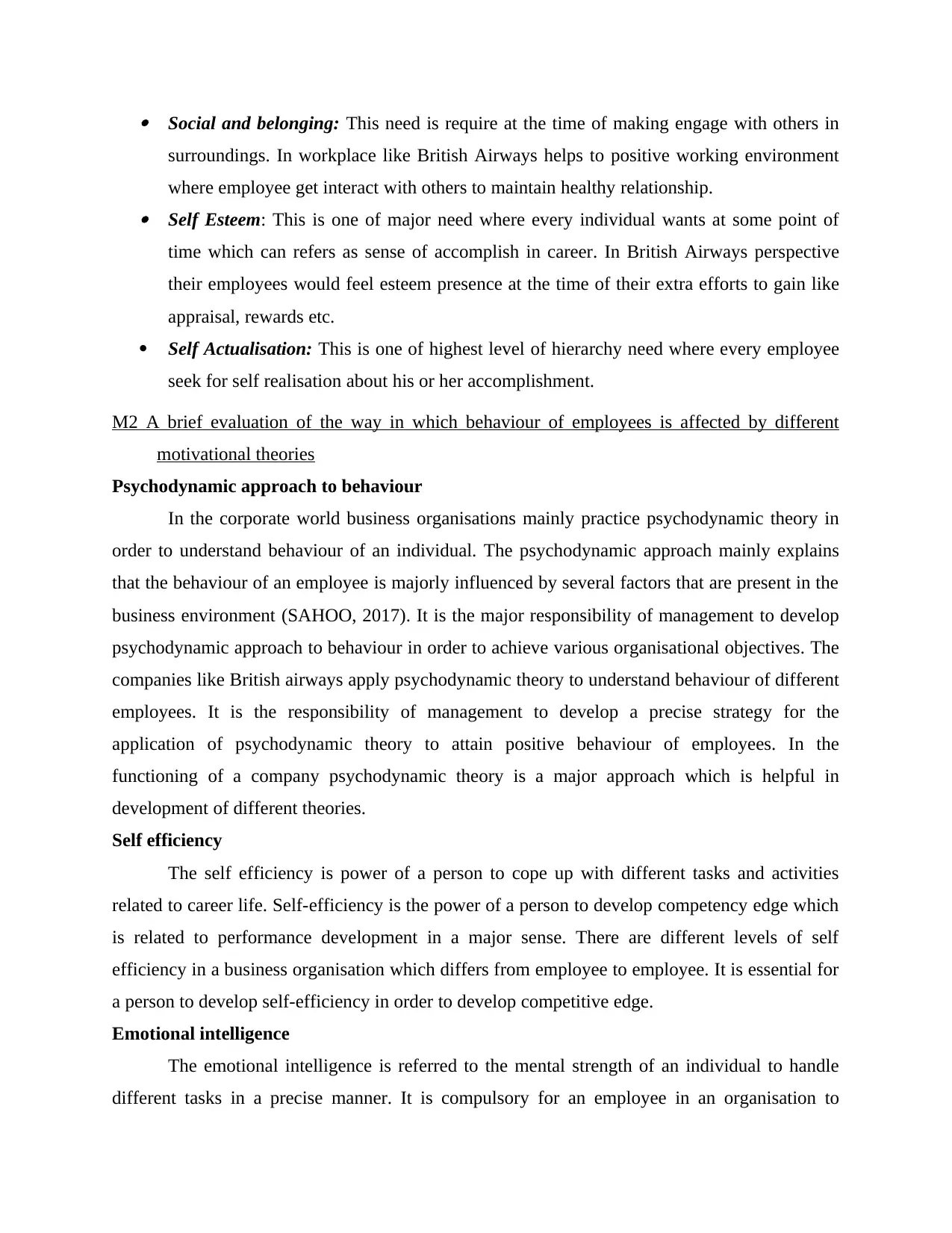
Social and belonging: This need is require at the time of making engage with others in
surroundings. In workplace like British Airways helps to positive working environment
where employee get interact with others to maintain healthy relationship. Self Esteem: This is one of major need where every individual wants at some point of
time which can refers as sense of accomplish in career. In British Airways perspective
their employees would feel esteem presence at the time of their extra efforts to gain like
appraisal, rewards etc.
Self Actualisation: This is one of highest level of hierarchy need where every employee
seek for self realisation about his or her accomplishment.
M2 A brief evaluation of the way in which behaviour of employees is affected by different
motivational theories
Psychodynamic approach to behaviour
In the corporate world business organisations mainly practice psychodynamic theory in
order to understand behaviour of an individual. The psychodynamic approach mainly explains
that the behaviour of an employee is majorly influenced by several factors that are present in the
business environment (SAHOO, 2017). It is the major responsibility of management to develop
psychodynamic approach to behaviour in order to achieve various organisational objectives. The
companies like British airways apply psychodynamic theory to understand behaviour of different
employees. It is the responsibility of management to develop a precise strategy for the
application of psychodynamic theory to attain positive behaviour of employees. In the
functioning of a company psychodynamic theory is a major approach which is helpful in
development of different theories.
Self efficiency
The self efficiency is power of a person to cope up with different tasks and activities
related to career life. Self-efficiency is the power of a person to develop competency edge which
is related to performance development in a major sense. There are different levels of self
efficiency in a business organisation which differs from employee to employee. It is essential for
a person to develop self-efficiency in order to develop competitive edge.
Emotional intelligence
The emotional intelligence is referred to the mental strength of an individual to handle
different tasks in a precise manner. It is compulsory for an employee in an organisation to
surroundings. In workplace like British Airways helps to positive working environment
where employee get interact with others to maintain healthy relationship. Self Esteem: This is one of major need where every individual wants at some point of
time which can refers as sense of accomplish in career. In British Airways perspective
their employees would feel esteem presence at the time of their extra efforts to gain like
appraisal, rewards etc.
Self Actualisation: This is one of highest level of hierarchy need where every employee
seek for self realisation about his or her accomplishment.
M2 A brief evaluation of the way in which behaviour of employees is affected by different
motivational theories
Psychodynamic approach to behaviour
In the corporate world business organisations mainly practice psychodynamic theory in
order to understand behaviour of an individual. The psychodynamic approach mainly explains
that the behaviour of an employee is majorly influenced by several factors that are present in the
business environment (SAHOO, 2017). It is the major responsibility of management to develop
psychodynamic approach to behaviour in order to achieve various organisational objectives. The
companies like British airways apply psychodynamic theory to understand behaviour of different
employees. It is the responsibility of management to develop a precise strategy for the
application of psychodynamic theory to attain positive behaviour of employees. In the
functioning of a company psychodynamic theory is a major approach which is helpful in
development of different theories.
Self efficiency
The self efficiency is power of a person to cope up with different tasks and activities
related to career life. Self-efficiency is the power of a person to develop competency edge which
is related to performance development in a major sense. There are different levels of self
efficiency in a business organisation which differs from employee to employee. It is essential for
a person to develop self-efficiency in order to develop competitive edge.
Emotional intelligence
The emotional intelligence is referred to the mental strength of an individual to handle
different tasks in a precise manner. It is compulsory for an employee in an organisation to
⊘ This is a preview!⊘
Do you want full access?
Subscribe today to unlock all pages.

Trusted by 1+ million students worldwide
1 out of 24
Related Documents
Your All-in-One AI-Powered Toolkit for Academic Success.
+13062052269
info@desklib.com
Available 24*7 on WhatsApp / Email
![[object Object]](/_next/static/media/star-bottom.7253800d.svg)
Unlock your academic potential
Copyright © 2020–2026 A2Z Services. All Rights Reserved. Developed and managed by ZUCOL.




